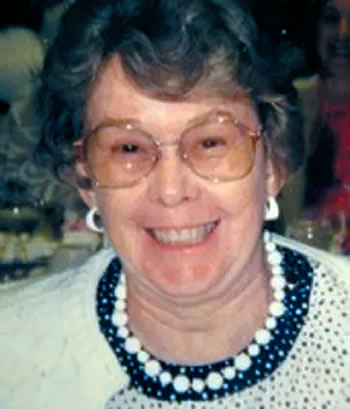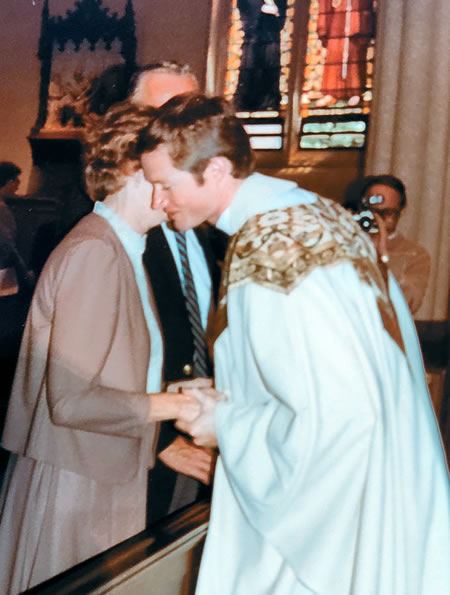
My Mom, Marie, was a happy mother, giving me, together with Dad, a wonderful sense of security that I appreciated from my earliest years.
I treasure the reassuring memories of the large gingerbread man she would make every Christmas, complete with a story to tell me and my sisters and brothers who arrived to the family after me, thanks to a special Betty Crocker cookbook from the 1950s that included the tale along with the recipe and pattern for the single large cookie. There were lots and lots of similar loving moments, of course.

She was studying at college for a degree in teaching, planning on working as a professional CCD (Confraternity of Christian Doctrine) professor, as Catholic education was termed before the Second Vatican Council (1962-1965). She was a smart lady, the valedictorian of her class at St. Michael’s High School in Union City, New Jersey.
“You’ll never be smarter than your mother,” my Dad would tell us, from time to time. Indeed, she always seemed a few steps ahead of me, even later on, as I grew up. When my parents adopted two baby boys after I entered the seminary, they brought them along with them about ten years later, when they visited me for a week in Chile, my assigned country as a Columban Father for 30 years. I marveled at what wise parents they had become, handling them with calm assurance and just the right amount of flexibility!
“Who are these people?”, I wondered. As the oldest child, my parents and I discovered together what skills were essential to family life, and I could take a little indirect pride at what my parents had learned, over time. My job here is done, I told myself, as I marveled at their patience and guidance of the two boys.
We also knew that a time would come when Mom would need to be cared for herself, towards the end of her life, by us, her children. Her own parents lived with us for a long time as we grew up, so we kept Mom’s example of caring for our parents in our hearts. Eventually, Mom moved in with one of my sisters after Dad died, and then, after my brother-in-law suddenly succumbed to a brain tumor, my second sister joined them.
There was a happy moment when Mom turned 90. My sisters invited relatives and many friends of the family to come over, and Mom loved it, especially when a couple of people her own age came to see her, and she remembered them! Soon afterwards, however, COVID-19 swept the world, just as Mom entered a stage of dementia.

As my ministry in El Paso, Texas, eventually shut down, I moved to New England and took the guest room of the house to help care for Mom at that stage. After so many years of my missionary priesthood spent in other countries and faraway regions of the world, it seemed to be the time to finally live closer to my family and help them.
We deeply feared what would happen if Mom contracted the coronavirus and had to be isolated in a hospital. We couldn’t take a chance of a well-meaning visitor accidentally passing on the virus to her, so we asked most people to stay away, especially if they hadn’t been vaccinated. Keeping Mom safe became our highest priority, especially when she would be at her most confused and vulnerable stage of life. She also became unreasonable, combative and delusional.
In my spiritual readings and retreats over the years, the idea was introduced to me that the people I found most challenging in life, and hard to get along with, were actually to be considered as my teachers. That is, they revealed to me my shortcomings and impatience, and pointed out areas in my life that still needed to grow. I needed to learn that the ways that others chose to relate to people or situations didn’t have to be the same as my own perspective or responses. “Troublesome” people could teach me new ways to understand a problem, and help me identify and dispel my hidden prejudices and generalizations about people. I needed to pay grateful attention to those who bothered me the most in my life. And we soon found that accompanying Mom would give us a doctoral-level course in the field of Caring for Parents with Dementia!
Increasingly, we found it harder to anticipate how she would get up in the morning. Sometimes, she couldn’t remember precisely who we were, while at other times her memories of early childhood seemed very available for her, as if they were experiences of only a few days before. We heard about beautiful moments of holding her dad’s hand, tales about her siblings and mother, and going to church. On St. Patrick’s Day, she surprised us by singing by heart many verses of old Irish songs.
We developed our own capacity for humor, too. When Mom complained of how often she would be made to get up and go the bathroom, she went so far one time as to declare that this would be the last time she would ever go. “After this, I refuse to go anymore!” My sister Mary took the threat in her stride, gently taking her arm and walking with her to the bathroom, saying, “Well, Mom, let’s make it one for the ages, then!”
Towards the end, with only weeks of life remaining, she seemed to regain clarity, and awareness that her time remaining with us was short. She began to tell us, “I want to go home, now.” At the end, the request took on a new meaning — she would be going home soon to our Creator’s embrace, and would see my father again.
Finally, we didn’t plan on any traditional dinner for Thanksgiving, because Mom was failing fast. She said goodbye to our relatives during her last week of life. Our wonderful neighbors brought over some of their Thanksgiving food to us in the evening, and we ate a few bites while sitting with Mom in her bedroom. A hospice nurse came by to help us, and Mom passed over into the New Life of Christ on the morning after Thanksgiving Day.
Thank you, indeed, dear God, for such a gifted and beautiful person that you provided for us as a model of a faithful and loving companionship to my Dad for over 60 years of marriage, a mother of five children and many more foster children. We selected the Biblical readings for her funeral Mass, including these lines, which seemed to appropriate:
When she opens her mouth, wisdom issues forth,
and on her tongue is kindly advice.
She keeps close watch on the conduct of her household,
and she does not eat the bread of idleness.
Her children stand up and proclaim her blessed,
and her husband joins them in praising her.
‘Many are the women who have done admirable things,
but you outdo them all.’
(Proverbs 31: 26-29)
Columban Fr. Robert Mosher lives and works in Rhode Island.